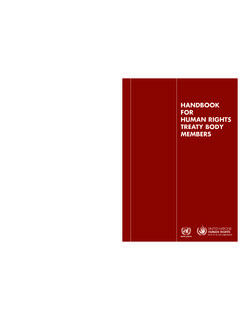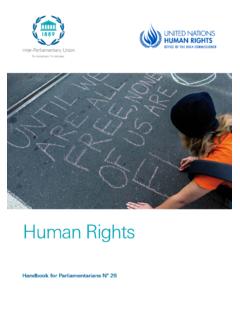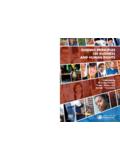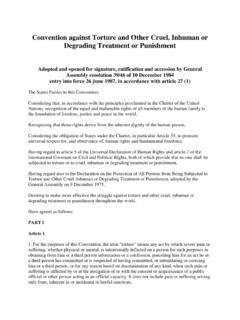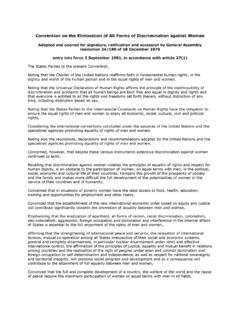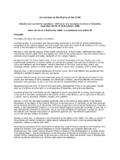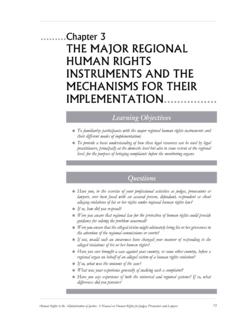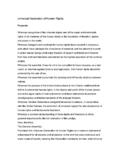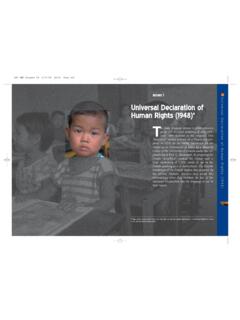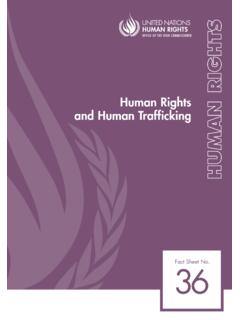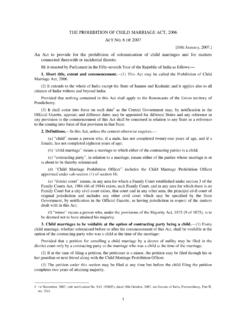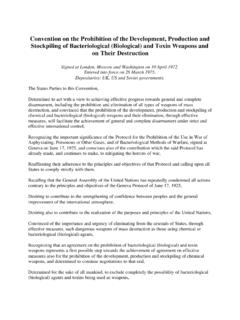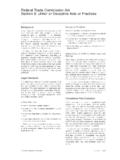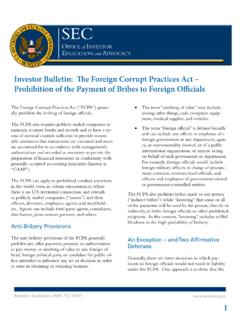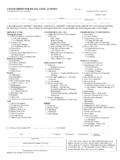Transcription of A/HRC/22/17/Add.4 General Assembly - ohchr.org
1 Human Rights Council Twenty-second session Agenda item 2 Annual report of the United Nations High Commissioner for Human Rights and reports of the Office of the High Commissioner and the Secretary- General Annual report of the United Nations High Commissioner for Human Rights Addendum Report of the United Nations High Commissioner for Human Rights on the expert workshops on the prohibition of incitement to national, racial or religious hatred* ** Summary The Office of the High Commissioner for Human Rights (OHCHR) organized a series of expert workshops on the prohibition of incitement to national, racial or religious hatred, in which legislative patterns, judicial practices and policies in this regard were explored.
2 This report summarizes the results of this initiative. In particular, it provides details on the wrap-up expert meeting organized in Rabat in October 2012, which brought together conclusions and recommendations from the expert workshops and resulted in the adoption by the experts of the Rabat Plan of Action on the prohibition of advocacy of national, racial or religious hatred that constitutes incitement to discrimination, hostility or violence, which is included in the annex to this report. * The summary of the present report is circulated in all official languages. The report, which is annexed to the summary, is reproduced in the language of submission only. ** Late submission. United Nations A/HRC/22/17 General Assembly Distr.
3 : General 11 January 2013 Original: English A/HRC/22/17 2 Annex [English only] Report of the United Nations High Commissioner for Human Rights on the expert workshops on the prohibition of incitement to national, racial or religious hatred Contents Paragraphs Page I. Introduction .. 1 15 3 II. Expert workshops on the prohibition of incitement to national, racial or religious hatred .. 16 18 5 Appendix Rabat Plan of Action on the prohibition of advocacy of national, racial or religious hatred that constitutes incitement to discrimination, hostility or violence .. 6 A/HRC/22/17 3 I. Introduction 1. In follow-up to the 2008 Expert seminar on the links between articles 19 and 20 of the International Covenant on Civil and Political Rights with regard to freedom of expression and incitement to hatred, the Office of the High Commissioner for Human Rights (OHCHR) organized, in 2011 and 2012, a series of expert workshops on the prohibition of incitement to national, racial or religious hatred, in which legislative patterns, judicial practices and policies in this regard were explored.
4 2. Over the years, we have witnessed a number of incidents which have sounded alarm bells about the level of hatred and cynicism that has permeated societies. Unfortunately a number of these incidents have led to violent reactions and deaths. Virulent and hate-laden advocacy can trigger the worst of crimes. Suffice it to recall recent examples of post-electoral violence spurred by hatred along ethnic lines; incidents involving extremist groups; abusive and malicious portrayal, online or in traditional media, of certain religions and their followers. It is clear that hatred has many faces and is present in all parts of the world. 3. As the High Commissioner for Human Rights, I have expressed alarm at the often extraordinarily negative portrayal in many countries of migrants, but also of minority groups by the media, politicians and other actors in the society.
5 I have called for measures to curb growing xenophobic attitudes and underlined the need to swiftly denounce hate speech and prosecute those suspected of inciting racial violence and those who have perpetrated racist and violent actions. 4. I have publicly condemned displays of hatred or bigotry towards followers of certain religions and urged religious and political leaders to do their utmost to restore calm. I have condemned the violence, including murders, that has taken place in reaction to such incidents in various parts of the world. 5. While the concept of freedom of expression has been well-established for many centuries in the legal traditions of different cultures, its practical application and recognition are still far from universal.
6 In many parts of the world, freedom of expression still faces formidable resistance from those who benefit from silencing dissent, stifling criticism or blocking discussion on challenging social issues. 6. With a view to enhancing our understanding of the relationship between freedom of expression and incitement to hatred, I took the initiative of organizing a series of expert workshops, in different regions of the world, to examine legislation, jurisprudence, and national policies with regard to the prohibition of national, racial or religious hatred as reflected in international human rights law. In October 2012, OHCHR convened a wrap-up expert meeting in Rabat, Morocco,1 in which the recommendations of the earlier expert workshops were discussed, resulting in the adoption of the Rabat Plan of Action.
7 The principal aim of the whole exercise was to conduct a comprehensive assessment of the implementation of legislation, jurisprudence and policies regarding advocacy of national, racial or religious hatred that constitutes incitement to discrimination, hostility or violence at the national and regional levels, while encouraging full respect for freedom of expression, as protected by international human rights law. 7. A total of five expert workshops were held in Vienna (9-10 February 2011), Nairobi (6-7 April 2011), Bangkok (6-7 July 2011), Santiago (12-13 October 2011) and Rabat (4-5 1 For the list of experts who attended the meeting, and background details please see A/HRC/22/17 4 October 2012).
8 We learned that many governments, in response to the challenges outlined above, have reinforced existing laws and introduced new punitive measures. The proceedings shone light on the problem of insufficient national legislation or of new, vague and unclear provisions that have been introduced and are open to misuse. Discussions also showed the uneven and ad hoc application of these laws, compounded often by the absence of dedicated and properly equipped institutions to implement or adjudicate them. Throughout the discussions, examples were provided of the negative impact of anti-blasphemy laws; problems relating to curbing freedom of information and the use of the Internet; harassment of journalists and human rights defenders; or instances where members of minorities are persecuted, with a chilling effect on others, through the abuse of vague or counter-productive legislation, jurisprudence and policies.
9 8. International expert bodies have a crucial role to play in guiding States in their implementation of provisions of human rights law on incitement to hatred thereby contributing to the progressive development of international law and defusing political tensions. In September 2011, the Human Rights Committee adopted General comment No. 34 on freedom of opinion and expression, and the Committee on the Elimination of Racial Discrimination has commenced consideration of a General recommendation on racist hate speech. Furthermore, joint position papers on the prohibition of incitement to hatred were presented in 2009 and 2011 by the Special Rapporteurs on contemporary forms of racism, racial discrimination, xenophobia and related intolerance; freedom of religion or belief; and the promotion and protection of the right to freedom of opinion and expression.
10 9. Properly balancing freedom of expression and the prohibition of incitement to hatred is no simple task. Let me state clearly that any limitations to this fundamental freedom must remain within strictly defined parameters flowing from the international human rights instruments, in particular the International Covenant on Civil and Political Rights and the International Convention on the Elimination of Racial Discrimination. Article 19, paragraph 3, of the Covenant lays down a clear test by which the legitimacy of such restrictions may be assessed. However, further guidance is needed in the real world when weighing freedom of expression against the prohibition of incitement to hatred.
